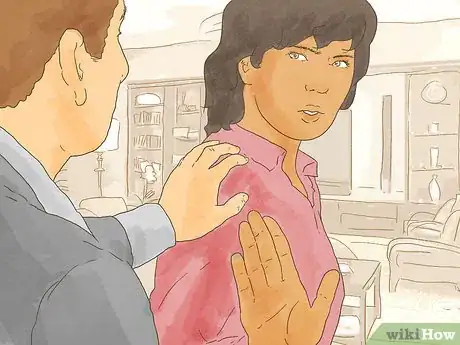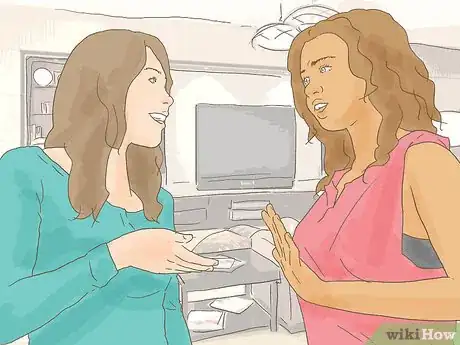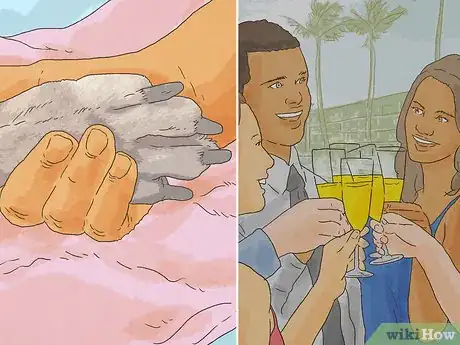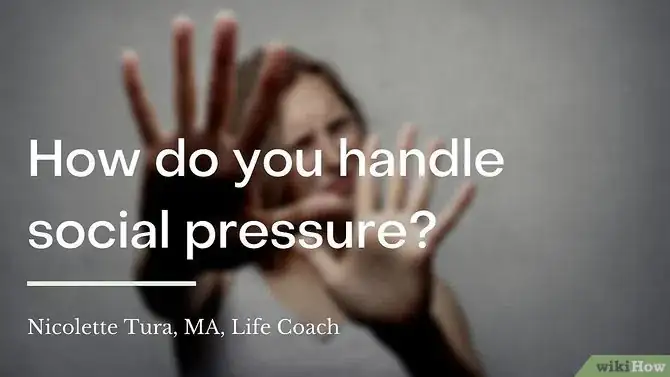This article was co-authored by Nicolette Tura, MA. Nicolette Tura is an Authentic Living Expert who operated her own wellness business for more than ten years in the San Francisco Bay Area. Nicolette is a 500-hour Registered Yoga Teacher with a Psychology & Mindfulness Major, a National Academy of Sports Medicine (NASM) certified Corrective Exercise Specialist, and is an expert in authentic living. She holds a BA in Sociology from the University of California, Berkeley and got her master's degree in Sociology from SJSU. She constantly draws from her own wounds and challenges; with her training in the healing arts and sociology, she offers potent content, powerful meditations, and game-changing seminars on inspiring elevation on a personal and corporate level.
There are 8 references cited in this article, which can be found at the bottom of the page.
wikiHow marks an article as reader-approved once it receives enough positive feedback. This article received 26 testimonials and 100% of readers who voted found it helpful, earning it our reader-approved status.
This article has been viewed 1,814,194 times.
Do you tend to put other people’s needs ahead of your own? Maybe you’re nervous about being disliked. Maybe you were simply raised to put other people first. Regardless of the reason, learning to prioritize your needs is easy if you practice. It’ll take some time to adjust, but start by saying “no” to some things instead of “yes” to everything. Create some boundaries and make your voice heard and your opinion matter. Above all, make time to care for yourself.[1] In this article, we’ll walk you through everything you need to know about taking charge and learning to not be a people pleaser.
Steps
Expert Q&A
Did you know you can get expert answers for this article?
Unlock expert answers by supporting wikiHow
-
QuestionHow do you handle social pressure?
 Nicolette Tura, MANicolette Tura is an Authentic Living Expert who operated her own wellness business for more than ten years in the San Francisco Bay Area. Nicolette is a 500-hour Registered Yoga Teacher with a Psychology & Mindfulness Major, a National Academy of Sports Medicine (NASM) certified Corrective Exercise Specialist, and is an expert in authentic living. She holds a BA in Sociology from the University of California, Berkeley and got her master's degree in Sociology from SJSU. She constantly draws from her own wounds and challenges; with her training in the healing arts and sociology, she offers potent content, powerful meditations, and game-changing seminars on inspiring elevation on a personal and corporate level.
Nicolette Tura, MANicolette Tura is an Authentic Living Expert who operated her own wellness business for more than ten years in the San Francisco Bay Area. Nicolette is a 500-hour Registered Yoga Teacher with a Psychology & Mindfulness Major, a National Academy of Sports Medicine (NASM) certified Corrective Exercise Specialist, and is an expert in authentic living. She holds a BA in Sociology from the University of California, Berkeley and got her master's degree in Sociology from SJSU. She constantly draws from her own wounds and challenges; with her training in the healing arts and sociology, she offers potent content, powerful meditations, and game-changing seminars on inspiring elevation on a personal and corporate level.
Authentic Living Expert
-
QuestionHow do I stop being a pushover?
 Nicolette Tura, MANicolette Tura is an Authentic Living Expert who operated her own wellness business for more than ten years in the San Francisco Bay Area. Nicolette is a 500-hour Registered Yoga Teacher with a Psychology & Mindfulness Major, a National Academy of Sports Medicine (NASM) certified Corrective Exercise Specialist, and is an expert in authentic living. She holds a BA in Sociology from the University of California, Berkeley and got her master's degree in Sociology from SJSU. She constantly draws from her own wounds and challenges; with her training in the healing arts and sociology, she offers potent content, powerful meditations, and game-changing seminars on inspiring elevation on a personal and corporate level.
Nicolette Tura, MANicolette Tura is an Authentic Living Expert who operated her own wellness business for more than ten years in the San Francisco Bay Area. Nicolette is a 500-hour Registered Yoga Teacher with a Psychology & Mindfulness Major, a National Academy of Sports Medicine (NASM) certified Corrective Exercise Specialist, and is an expert in authentic living. She holds a BA in Sociology from the University of California, Berkeley and got her master's degree in Sociology from SJSU. She constantly draws from her own wounds and challenges; with her training in the healing arts and sociology, she offers potent content, powerful meditations, and game-changing seminars on inspiring elevation on a personal and corporate level.
Authentic Living Expert
-
QuestionHow can I stop wanting to please everyone?
 Nicolette Tura, MANicolette Tura is an Authentic Living Expert who operated her own wellness business for more than ten years in the San Francisco Bay Area. Nicolette is a 500-hour Registered Yoga Teacher with a Psychology & Mindfulness Major, a National Academy of Sports Medicine (NASM) certified Corrective Exercise Specialist, and is an expert in authentic living. She holds a BA in Sociology from the University of California, Berkeley and got her master's degree in Sociology from SJSU. She constantly draws from her own wounds and challenges; with her training in the healing arts and sociology, she offers potent content, powerful meditations, and game-changing seminars on inspiring elevation on a personal and corporate level.
Nicolette Tura, MANicolette Tura is an Authentic Living Expert who operated her own wellness business for more than ten years in the San Francisco Bay Area. Nicolette is a 500-hour Registered Yoga Teacher with a Psychology & Mindfulness Major, a National Academy of Sports Medicine (NASM) certified Corrective Exercise Specialist, and is an expert in authentic living. She holds a BA in Sociology from the University of California, Berkeley and got her master's degree in Sociology from SJSU. She constantly draws from her own wounds and challenges; with her training in the healing arts and sociology, she offers potent content, powerful meditations, and game-changing seminars on inspiring elevation on a personal and corporate level.
Authentic Living Expert
References
- ↑ Michelle Shahbazyan, MS, MA. Life Coach. Expert Interview. 18 March 2020.
- ↑ https://greatergood.berkeley.edu/article/item/21_ways_to_give_good_no
- ↑ https://www.npr.org/2020/09/15/913207918/how-to-say-no-for-the-people-pleaser-who-always-says-yes
- ↑ Michelle Shahbazyan, MS, MA. Life Coach. Expert Interview. 18 March 2020.
- ↑ https://www.npr.org/2020/09/15/913207918/how-to-say-no-for-the-people-pleaser-who-always-says-yes
- ↑ Michelle Shahbazyan, MS, MA. Life Coach. Expert Interview. 18 March 2020.
- ↑ https://www.apa.org/gradpsych/2014/11/stand-up
- ↑ Michelle Shahbazyan, MS, MA. Life Coach. Expert Interview. 18 March 2020.
- ↑ https://www.npr.org/2020/09/15/913207918/how-to-say-no-for-the-people-pleaser-who-always-says-yes
- ↑ https://www.apa.org/gradpsych/2014/11/stand-up
- ↑ https://www.psychologytoday.com/us/blog/romantically-attached/201608/4-ways-set-and-keep-your-personal-boundaries
- ↑ https://hbr.org/2012/10/compromising-when-compromise-i
- ↑ Michelle Shahbazyan, MS, MA. Life Coach. Expert Interview. 18 March 2020.
- ↑ https://my.clevelandclinic.org/health/articles/12942-fostering-a-positive-self-image
- ↑ Michelle Shahbazyan, MS, MA. Life Coach. Expert Interview. 18 March 2020.
- ↑ https://www.psychologytoday.com/blog/prescriptions-life/201310/how-stop-people-pleasing
About This Article
To stop being a people pleaser, start by telling yourself, "I can make a decision to say yes or no,” to remind yourself that you have choices. Then, practice saying “no” to small requests, such as going out with a friend when you’d rather stay in, so that you can build up to standing up for yourself in bigger matters. Additionally, don’t be afraid to speak up and let others know what you want while staying calm and firm. For example, if your friend invites you out for Italian food, but you’d rather have Korean, tell them you’d like to get Korean food next time. For tips on how to compromise while setting healthy boundaries, read on!












































































